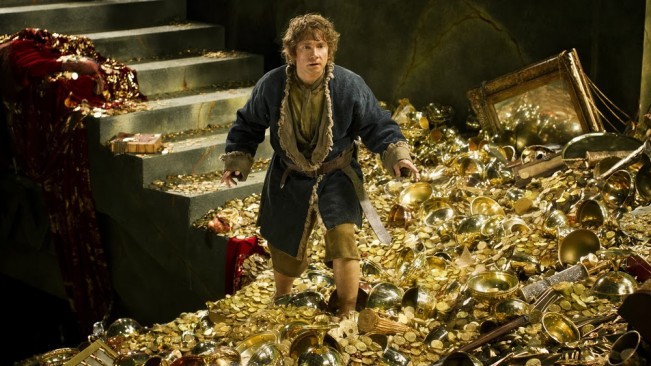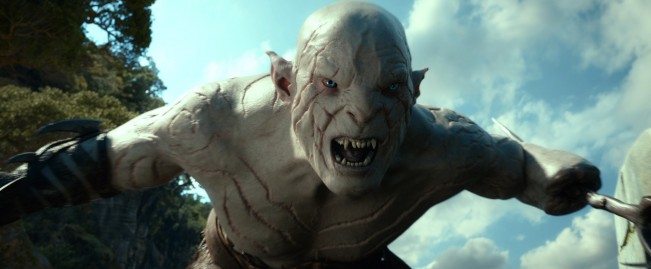

By Mike Wilmington Wilmington@moviecitynews.com
Wilmington on Movies: The Hobbit: The Desolation of Smaug
THE HOBBIT: THE DESOLATION OF SMAUG (Four Stars)
New Zealand-U.S.: Peter Jackson, 2013
And the riot squad, they’re restless. They need somewhere to go.
As Lady and I look out tonight from Desolation Row.
Bob Dylan
I. HOBBIT-FORMING
Even before they bring on Smaug the dragon in The Hobbit: the Desolation of Smaug, it’s an amazing show. The second rip-roaring section of Peter Jackson’s three-part adaptation of J. R. R. Tolkien’s epic, whimsical masterpiece “The Hobbit,” the picture pretty well drenches you with thrills: repeatedly riveting you to your seat or blowing you right out of it — before Smaug comes on in the last act and burns down the house.
The second Hobbit picture is a prime example of the modern movie as action spectacle, with director Jackson and his technical wizards pulling off one visual miracle after another — relentlessly chasing you and the thirteen dwarfs (and one hobbit) on their quest all around Middle Earth, trapping you in giant shimmering spider webs with mammoth spiders scuttling on the attack, hauling and hurling you down a bouncing, leaping hell-for-leather white-rapids barrel ride, pursued by deadly gray orcs and protected by deadlier archer elves — and finally putting you face to face with Smaug himself, a monster’s monster slithering out of a heap of gold coins with a monstrous unblinking eye like Death dipped in ice.
This new movie, adapted, like Jackson’s Lord of the Rings Trilogy and last year’s The Hobbit: An Unexpected Journey, from one of the great literary classics and novel series of the twentieth century, as plucked from the formidably learned work and playful fairytale intricacies penned by British classics professor Tolkien, is, like its source novel, also a delightfully thrilling entertainment. It’s as exciting as Hell, and not as permanent — though Smaug, the dragon of your worst nightmares, looks and sounds (thanks his voice actor, the ubiquitous Benedict Cumberbatch) as if he could stoke several circles of Hell all by himself. If there was ever a better, more ferocious, more astonishing and fire-breathingly horrifying dragon, or a better, scarier movie monster of any kind \, anywhere, anytime, I have yet to see it — and pray to St. George, that I’m in a nice safe 3D movie theatre if I do.
There haven’t been many better movie adventure epics either. As we follow the hobbit of the title, resourceful and gutsy little Bilbo Baggins (played with lots of Brit theatricality and empathy by Martin Freeman), through Bilbo’s and the thirteen dwarves’ quest led by stern-eyed rebel chief Thorin Oakenshield (Richard Armitage), the movie keeps getting better and better, more and more visually ravishing and wildly kinetic and grandiloquently epic.
Now, it‘s become a kind of article of critical faith (or a cliché, pick what you will) to trash the first Hobbit movie, to maintain that the first episode of Jackson‘s Hobbit trilogy was sort of a three hour dud, dull at times as the dirge of an Oxford don — and that this action-packed ring-a-ding extravaganza has redeemed the series, redeemed Jackson. Smaug to the rescue. The audience, supposedly after snoozing through Jackson‘s the Hobbit, An Unexpected Journey, and all its 3D, 48 f.p.s. wonders, suddenly woke up.
I disagree. I liked the first movie fine, and I don’t think it would have been improved at all by having less hobbit byplay and dwarf revels and more action, more violence, more Orc and wolf assaults, more supposedly audience-pleasing blood and guts. I liked the scene-setting in Part One, and if some reviewers were getting impatient for the chases and battles to commence, well, I think it should have been obvious that when the action finally kicked in (and there was certainly some in the first film, The Hobbit: An Unexpected Journey), it was going to be amazing.
The trouble with most of the big action movies these days, of all varieties, is that they have too much non-stop action nd incessantly clanging and clamorous bang-bang. Most of them could use more scene-setting, more modulation, more contrast, more talk and characterization, more humanity, more dwarfishness, more Hobbitishness. Taking half an hour or so to introduce us to Bilbo and the dwarfs, and to reintroduce us to Gandalf the Grey (Ian McKellen), the long, tall Wizard who sends them on their quest, didn’t strike me as wasted effort. In fact, I would have liked a little more.
Nor do I think, as some reviewers have theorized, that there was too much of a muchness in the Hobbit, Part One, and that it was probably for purely mercenary reasons — that it was all a commercially driven plot to make more money by shooting more footage, wresting another trilogy from a relatively small 300 page novel, that would have been better served by one film (with more action) rather than three. But frankly, it’s only the economics of movie theatre showings and concession stand sales that seems to dictate that a 300 page (or more) novel is best translated to the big screen by turning it into a two hour (or three hour) movie. To the contrary, British television and its many sometimes excellent classic literary adaptations, have taught us that the best way to adapt Dickens or Thackeray or Evelyn Waugh, or even Jane Austen, is usually to make them as a mini-series, in something closer to four to ten hours. Nine or more hours, in three sections, may actually be just about right for a novel as packed with incident and character and dragon attacks as “The Hobbit.“.
II. SMAUG ALERT
So, what happens in this (about) five-chapter-long excerpt from “The Hobbit “ that Jackson and his fellow writers (Fran Walsh, Phillippa Boyens and the replaced erstwhile director Guillermo Del Toro) have given us? After a tavern reintroduction of Gandalf and Oakenshield, we get back to where we left off in the “Unexpected Journey”: the dwarf’s quest to reclaim that kingdom from Smaug. The dwarves (and one hobbit) ramble through Mirkwood forest where the spiders weave their webs. They face the gray, kill-crazy Orcs and their murderous leader Azog (Manu Bennett), and meet the (initially) bear-like beast-man Beorne (Mikael Persbrandt). They encounter the elves, including the pompous and irritating Elf King Thranduil (Lee Pace), and our old friend, the dashing, blond-tressed Legolas (Orlando Bloom), and a new friend (new to Tolkien too), the deadly, foxy and spectacular archeress Tauriel (Evangeline Lilly) — Tauriel having been added to the story by the more feminist-minded modern writers (and they were right).
Then there’s that incredible barrel river chase, and the dwarf troop’s entry into the human city of Laketown, thanks to sullen and brave bargeman Bard (Luke Evans), who smuggles them into Laketown in fish barrels full of fish. There. we meet the corrupt town boss known simply as The Master of Laketown (Stephen Fry, who makes the Master rot away amusingly before our eyes). More chases, more characters, more, yes, action. And we still haven’t gotten to the movie‘s incontestable piece de resistance, the battle of wits and booby traps between Bilbo and his friends and the enormous and truly hideous (and strangely sexy) Dragon Smaug, voiced as if through a Darth Vader echo chamber, by Cumberbatch. (Cumberbatch and Freeman have also been cast opposite each other as the small British screen’s latest Sherlock Holmes and Dr. Watson, so this can be seen, if you’re feeling whimsical, as a kind of dry for this dry run, in which Smaug doesn’t quite do everything but play a violin and shoot cocaine and murmur “Elementary, my dear Baggins.”)
I was somewhat bewildered that the dwarves got their anti-Smaug weaponry together so fast, but maybe I missed something. Anyway, does anyone really feel that three hours is too much for all that stuff? To the contrary, those are five damned smoking’ chapters. It’s possible that The Lord of the Rings was too rushed.
I think it’s better to view Desolation of Smaug and its predecessor less as single movies, or economic ventures, than as a piece of the whole — the blessedly entire three part “Hobbit,‘ which rises and falls, and rips and roars, and modulates and contrasts to its heart’s content and that of its hearty New Zealand main maker, Peter Jackson.
I thought, after seeing the whole Lord of the Rings trilogy run its course, that I’d seen one of the great films of all time: a movie to rival Citizen Kane (or, for that matter Vertigo), the great popular art trilogy that Francis Coppola’s Godfather should and could have been. The Hobbit, in many was, so far, is almost as good; I will admit that Satyajit Ray‘s Apu Trilogy, which has no action scenes to speak of, is better than either. But then, The Apu Trilogy is not exactly popular art.
So far, The Hobbit is a genuine continuous narrative and though Jackson almost certainly had more than box office on his mind in structuring this new trilogy, if that was his commercial strategy, it was a good one. And an artistically justifiable one as well. After all, we’d probably all prefer to have Erich von Stroheim’s ten hour cut of Greed, the one that Irving Thalberg and Louis B. Mayer trashed, in a strategy that was neither commercial nor artistic. Would today’s critics, if they’d been around in 1925, have applauded Thalberg’s cut and demanded a shorter movie from von Stroheim? Why complain if Jackson gives us more? The movie of The Hobbit, Smaug and all, is a huge fantastic, fabulous show, full of rich pleasures and wild delights, and it’s a Middle Earth kick that Jackson got so much of it on screen. The Hobbit, and especially this chunk of it, pleases us for its literary qualities, for Tolkien’s mastery of deeply knowledgeable myth-making, for its acting, for its astounding cinematic legerdemain, and, last but not least, for its deliciously and hellaciously exciting action. I saw it in the 3D format at the Chinese Theatre multiplex in Hollywood, and I only wish I’d been able to see it again later on the huge main Chinese Theatre IMAX screen. Maybe I will, right now. Once again, I’m sure it will dwarf my expectations.
















I mostly agree though it should be noted the main problem a lot of fans have with the series isn’t that it’s too long perse but that Jackson added a lot of material that wasn’t in the Hobbit book or in some cases even in the wider middle earth mythology.